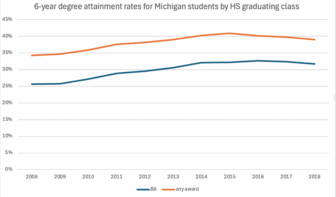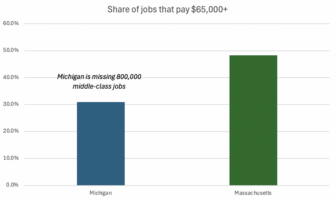As we explored previously Michigan is now a low wage state. What a turnaround! From Henry Ford’s $5 a day wage in 1914 Michigan was the place where if you were willing to work hard you could earning a living and realize the American Dream. No more.
Two new studies provide more evidence on the decline in wages. Both worth reading. The first comes from the Michigan League for Public Policy. It documents the decline in Michigan wages over the past three decades. The headline: Michigan has seen the second lowest change in median hourly wage between 1982 and 2012. (Only Alaska ranks lower.) Corrected for inflation, over those three decades, Michigan’s average hourly wage declined by seven percent and its national ranking fell from 4th to 24th.
Consistent with our work –– and that of many others –– the report finds that those Michiganders with the highest wages are those with the highest education attainment. The average hourly wage for those with a high school degree is $13.09 for those with a four year degree or more its almost double at $25.85.
As we explored previously, the importance of education attainment to higher wages is the topic of a terrific new report from the Economic Policy Institute. Entitled A Well-Educated Workforce Is Key to State Prosperity. The major finding: “Overwhelmingly, high-wage states are states with a well-educated workforce. There is a clear and strong correlation between the educational attainment of a state’s workforce and median wages in the state.”
Michigan is 34th in college attainment. Its the major reason why we are now a low wage state. And the path to becoming a high wage state once again is primarily increasing education attainment.
The EPI study also looks at the correlation between state taxes and median wages and finds none. They find: “The figure shows no clear relationship between state taxes (as a share of state personal income) and median wages. Higher-tax states appear to have slightly higher median wages, but that correlation is not significant.”
From the evidence EPI’s policy recommendations –– similar to Michigan Future’s –– are:
States can build a strong foundation for economic success and shared prosperity by investing in education. Providing expanded access to high quality education will not only expand economic opportunity for residents, but also likely do more to strengthen the overall state economy than anything else a state government can do. Cutting taxes to capture private investment from other states is a race-to-the-bottom state economic development strategy that undermines the ability to invest in education.






